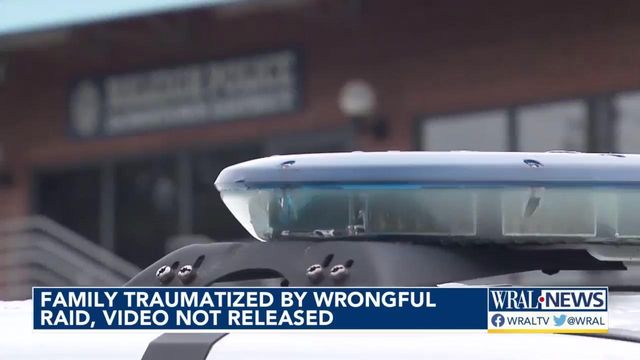'We were violated:' Family upset over judge's decision to not publicly release body camera footage of RPD raid
A Wake County judge's decision not to publicly release body camera footage of a team of officers raiding a home is angering families who lived through the experience.
Posted — UpdatedYolanda Irving said she and her three children were at their home on Burgundy Street in May 2020 when a SWAT team from the Raleigh Police Department invaded their space with assault rifles.
"It was a traumatic incident ... guns being drawn and us being thrown on the floor," said Irving.
Abraham Rubert-Schewel, an attorney representing the Irving family, said that the search warrant issued did list the family's correct address, but a picture on the warrant did not match the Irvings' home. The person of interest also did not live at the address listed on the warrant.
"We were violated ... [there] was no drugs, no money, nothing in there," said Irving.
Irving and Emancipate NC, a civil rights group, called for body camera footage of the raid to be released publicly.
But, Judge Bryan Collins with the Wake County Superior Court ruled Wednesday that only parts of the footage would be released, and only to the legal team.
"I was very, very upset ... with him not releasing it, it really was like a shock," said Irving. "Why wouldn't you do that? You're supposed to be there to protect us."
Sherita Walker, an attorney representing the Raleigh Police Department, objected to the release — stating it wasn't a critical incident that resulted in injury or loss of life.
"Here, we have a case where officers were acting on information that they had at the time based on information that was contained in the search warrant," said Walker.
A next door neighbor said her house was also swarmed and searched.
"I wasn't in the house when they raided. I was coming from the grocery store," said Walton. "When I was backing my car in, an officer came with a gun and basically opened my door and he was like, 'Get out of the car. What unit you stay in?' [My] kids took more of a hit than I did."
Walton said she wants Raleigh police to be held accountable for the raid.
"I really don't believe we're going to get [an apology.] It's going to take somebody's baby getting killed from them raiding somebody's house ... They're always trying to cover up their officers but they're supposed to be serving our community in every which way they can," said Walton.
"[There's] no closure," said Irving. "We're still traumatized behind this. RPD has got to be held accountable for this."
Irving said releasing body camera footage can be a learning lesson to prevent other people from experiencing what she went through.
"For you to walk into somebody's home, come into somebody's home, and violate us like that — it's wrong. It's really wrong," said Irving. "This could have happened to anybody."
On Wednesday night, Rubert-Shewel said "the judge has the power to reconsider his decision, and we hope he will." Rubert-Schewel also called on Raleigh City Council to join the petition for the footage to be released.
"In the interest of transparency and full accountability, we hope [Mayor Mary-Ann Baldwin] and city leaders will take that step and ask for a release," he said in a statement.
Related Topics
• Credits
Copyright 2024 by Capitol Broadcasting Company. All rights reserved. This material may not be published, broadcast, rewritten or redistributed.






